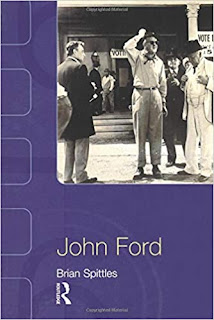Brian Spittles's John Ford (Harlow, Eng: Longman, 2002) is a
good brief monographic introduction to the film career of noted American film
director John Ford. Over the course of his monograph, Spittles explores Ford as auteur, Ford as a collaborator with other craftspeople and other actors including the stock company that worked with him over the years, Ford as storyteller, Ford as an artist of the film frame, Ford as a genre director, the themes in Ford's films, and the relationship between Ford the filmkaker and his broader social and cultural environment over the course of his film career.
Along the way Spittles makes a number of interesting observations. Ford, he notes, could be a bully on set pointing up the fact that many directors have, over the years, had militarisitic and authoritarian streaks much like military leaders (think George Patton) and football and basketball coaches (think Bob Knight). Spittles notes the ambiguity in Ford's representation of First Peoples, Blacks, and women over the years, something that some film critics these days too often miss or paper over in their film criticism. Spittles uses interviews with those who knew and worked with Ford and with Ford himself, primary source research, something which adds much to Spittles analysis and points up the lack of primary research in so much contemporary film criticism. Spittles nicely uses particular films Ford made over the course of his career to generalise about his film career.
Speaking of ambiguity, my response to Ford's films has, over the years, grown increasingly ambiguous. When I was younger I was simply not intellectually able to take a more critical response to Ford's films despite growing up in the more critical 1960s. This change in my approach to films and how I read them was foregrounded for me recently as I rewatched Young Mr. Lincoln, Ford's famous and critically praised 1939 film. I can't remember or recall my first response to the film. I suspect that I wanted to see the film because it was a John Ford film and John Ford was, according to critics and other directors like Orson Welles and Kurosawa Akra, one of America's and one of the world's great directors. In those auteur centred and celebrated days I tried to see as many of the films of critically regarded directors on television or at the cinema when I could. As I rewatched Young Mr. Lincoln, however, I watched it less as a film fan and more as a social scientific critic. I noted, thanks to critical work on Ford I had read over the years and thanks to my more critical gaze, Ford's limited utilisation of close-ups, Ford's use of doors as frames, Ford's mythic celebration of America, in the Young Mr. Lincoln case the myth and legend of folksy Honest Abe Lincoln, Ford's emphasis on landscape and his use of landscape as a character, though it was not as noticeable in Young Mr. Lincoln as in the films Ford shot in the aptly named Monument Valley, a landscape Ford went back to again and again over the course of his career and particularly in his westerns, and the antinomy between frontier and spreading civilisation in much of Ford's film work, in the case of Young Mr. Lincoln, the law.
As I have grew older, gained more education, and became more critically inclined I find myself "liking" Ford's darker and more critical films such as The Grapes of Wrath (1940), The Searchers (1956), The Man Who Shot Liberty Valence (1962), and Cheyenne Autumn (1964) more than his earlier more celebratory fairy tale movies. These darker films, like the more critical sixties I grew up in and eventually imbibed and embodied, seem to me to deconstruct, to raise questions about, to undermine or at least partially critique, Ford's earlier nostalgia, his earlier celebration of American nationalism and American manifest destiny, his earlier myth making (Ford printing the legend), his earlier emphasis on and antinomy of individualism and community, something often represented in music and dance, his earlier representation of First Peoples, and his earlier less critical representation of the conquerors of the American frontier. Ford's later representation of the John Wayne character in The Searchers, who seems to be a sociopath on the rampage for much of that film, seems to me to be a more realistic representation of the White right wing "nativist" American who appears to be more common or just more obvious in the age of Trump. In all this these darker films appeal to the now more critical critic and realist that is very much a part of me these days.

No comments:
Post a Comment